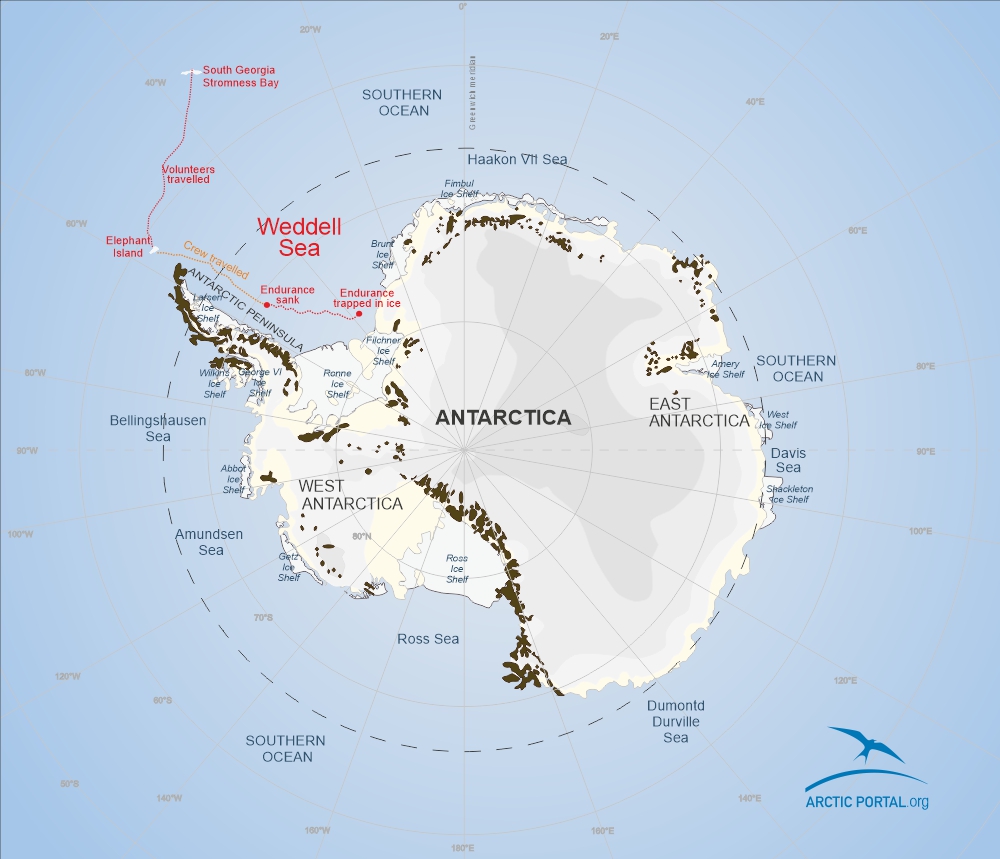
So seems like folks had a lot fun last week pointing out how it's silly to say "north of Antarctica" (regarding the discovery of Shackleton's lost ship).
Well, I'm here to say that it's silly to point out that it's silly to say "north of Antarctica".
A thread 👇
Well, I'm here to say that it's silly to point out that it's silly to say "north of Antarctica".
A thread 👇
I'm a cartographer with a background in environmental education. I am also married to a physicist (@Ice_BBerg) who's done significant glaciology modelling research about Antarctic.
📍 Here's why "north of Antarctic" is actually a meaningful statement...
📍 Here's why "north of Antarctic" is actually a meaningful statement...
How are scientists able to work together to research and communicate information about a continent without a useful reference system?
🧭 That is, if north is meaningless?
🧭 That is, if north is meaningless?
Answer: It's hard. To remedy this, scientists use a widely accepted way of presenting Antarctica so there's a standard "north" to use as reference.
Check out this epic DEM that uses the conventional way scientists map Antarctica, with "north" at the top.
doi.org/10.5194/tc-13-…
Check out this epic DEM that uses the conventional way scientists map Antarctica, with "north" at the top.
doi.org/10.5194/tc-13-…

This "north" is established from the fact that the continent is split into the formally named "West Antarctica" and "East Antarctica".
⛰️ These regions mostly align with which hemisphere they fall into and are separated nicely by the Transantarctic Mountains.
⛰️ These regions mostly align with which hemisphere they fall into and are separated nicely by the Transantarctic Mountains.

"West Antarctica" and "East Antarctica" were first named during Antarctic expeditions in the early 1900s.
They were formally approved in 1962 by the Advisory Committee on Antarctic Names, an advisory committee of the U.S. Board on Geographic Names.
They were formally approved in 1962 by the Advisory Committee on Antarctic Names, an advisory committee of the U.S. Board on Geographic Names.
Each region has their own major ice sheet, e.g. the West Antarctic Ice Sheet (WAIS).
🧊 Scientists study WAIS to more accurately understand past and future climate change. This ice sheet is also a HUGE potential contributor to sea level rise.
Map Source: carbonbrief.org/guest-post-how…
🧊 Scientists study WAIS to more accurately understand past and future climate change. This ice sheet is also a HUGE potential contributor to sea level rise.
Map Source: carbonbrief.org/guest-post-how…

So, when my husband talks about his modelling research that has relevance to Thwaites Glacier in *Western* Antarctica, his audiences have a unified frame of reference for where that is.
It's easy for them to assign ✨meaning✨ to its location.
thwaites-explorer.org
It's easy for them to assign ✨meaning✨ to its location.
thwaites-explorer.org

So yes, it is technically, geographically correct that *everywhere* is north of Antarctica.
BUT...
BUT...
As cartographers, we need ensure our maps aren't just technically correct, but also accurately reflect the historical, political, & scientific nuances of our subjects.
We endeavor to represent the world, but there will never NOT be a human lens that our maps are viewed through.
We endeavor to represent the world, but there will never NOT be a human lens that our maps are viewed through.
It's a mapmaker's obligation to "communicate information in the most accurate and understandable way" (@AllenCarroll @_AileenBuckley).
How can we expect to make understandable maps if we don't appreciate how our audiences derive meaning from our maps?
esri.com/arcgis-blog/pr…
How can we expect to make understandable maps if we don't appreciate how our audiences derive meaning from our maps?
esri.com/arcgis-blog/pr…
Really, the climate change convo is already controversial enough.
Thankfully, this unified reference system exists.
We don't need to waste time getting everyone on board with *where* the Doomsday Glacier is and can dive straight into why it's important.
Thankfully, this unified reference system exists.
We don't need to waste time getting everyone on board with *where* the Doomsday Glacier is and can dive straight into why it's important.
So there you have it: it's silly to point out that it's silly to say "north of Antarctica". If anything, point out that journalists said "north" of Antarctica instead of "northwest" since that's obviously more accurate. 😝
Map Source: arcticportal.org/ap-library/new…
Map Source: arcticportal.org/ap-library/new…

• • •
Missing some Tweet in this thread? You can try to
force a refresh



